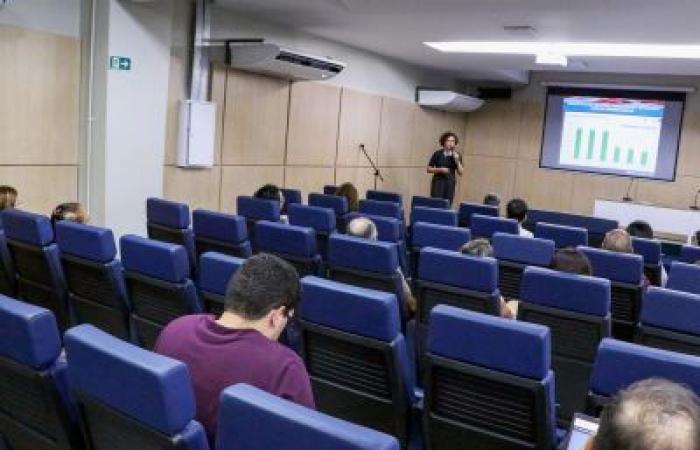Event aimed at doctors from Greater Belém was held in partnership with the Sociedade Paraense de Infectologia
Specialists from the Pará Society of Infectious Diseases (SPI) highlighted, on Friday (26), the importance of vaccination and early diagnosis to prevent cases of meningitis in Pará. It was during the training “Management of Meningococcal Disease Cases: Clinical and Epidemiological Strategies ”, promoted by the State Department of Public Health (Sespa) in partnership with SPI, in the Sespa auditorium.
Aimed at doctors from the public and private network in the municipalities of Belém, Ananindeua, Marituba, Benevides and Santa Bárbara, who are part of Sespa’s 1st Regional Health Center (CRS), the objective of the event was to provide updated information and effective strategies for treatment and prevention of meningococcal meningitis and improve the quality of care provided to the population.
The content was taught by the infectious disease specialist and president of SPI, Alessandre Guimarães; and by the infectious disease specialist and scientific coordinator of SPI, Irna Carneiro. They talked about prevention, early detection and assertive treatment.
For doctor Alessandre Guimarães, the fundamental issue is to prevent cases of meningitis from getting worse and people dying from the disease.
“In addition to preventing people from getting a severe form of the disease and dying, we want to urge the population to return to vaccination programs, as, unfortunately, we are experiencing a drop in vaccination coverage like never seen before since the implementation of the National Program of Immunizations (PNI) in 1973″.
Because of this reality, according to Irna Carneiro, there is a movement led by the Brazilian Society of Infectious Diseases (SBI) to which SPI is affiliated, with the purpose of drawing the population’s attention to start worrying about vaccination because the majority of Diseases are vaccine-preventable in both childhood and adulthood. “We need to return to vaccination coverage levels. We need to be proud of a National Immunization Program, which has already been considered the best in the world by the World Health Organization (WHO)”, she emphasized.
The infectious disease specialist also said that all fake news definitely needs to be clarified. “So, what is not fake is that we need to always get vaccinated and keep our vaccination schedule up to date, and see that diseases like meningitis are preventable with vaccination,” she commented.
Regarding the role of SPI, Irna Carneiro said that SPI is available to promote knowledge and that for a patient with suspected meningitis to be well cared for, it is necessary to have knowledge and that this knowledge needs to be disseminated.
Thus, the objective of the SPI is to train health professionals to understand infectious diseases in general, provide adequate knowledge so that these professionals can identify the disease, in this case meningitis, correctly and take the best therapeutic approach. “With this, we avoid complications and mortality from meningitis”, emphasized the infectious disease specialist.
Service network – The coordinator of Sespa’s Meningitis Technical Group, Diana Lobato, informed that the update for doctors is justified because of the risk of an increase in cases of the disease during the rainy season and the fact that there is no vaccine for all types of meningitis within the scope of the Unified Health System (SUS). “So, our concern is to properly manage the patient, treat them early, prevent new cases and avoid death from bacterial meningitis,” she said.
According to Diana Lobato, there is currently a structured network in the Metropolitan Region of Belém, which directs patients with suspected meningitis to the Meningitis Diagnostic Unit (UDM), which operates at the João de Barros Barreto University Hospital. UDM responds to any suspected case of meningitis. All the doctor or healthcare professional needs to do is refer the patient there. “However, any hospital that has a doctor trained in collecting cerebrospinal fluid (CSF) can collect it, activate the Municipal Epidemiological Surveillance and forward the sample for analysis at the Central Laboratory of (Lacen-PA), which is the reference laboratory”, he highlighted. .
The coordinator of the GT-Meningitis highlighted that professionals in the private network must contact the Municipal Epidemiological Surveillance upon a suspected case of meningitis. “Every hospital that has a suspected case of meningitis has to call Municipal Surveillance, which, in addition to helping with the process of sending samples for analysis, will provide all the necessary guidance for handling the case,” she said.
Diana Lobato also said that even if the hospital sent a sample to a private laboratory, the Ministry of Health’s Health Surveillance Guide recommends that this sample should also be sent to Lacen-PA.
Partnership – For the director of the Department of Epidemiology (Depi), Daniele Nunes, the partnership with SPI is essential to mobilize the main actors who will work in managing the case of patients, who are doctors. “We know how difficult it is for a doctor to participate in training and the Society managed to mobilize well so that Sespa can reach this audience”.
Daniele Nunes informed that the training was recorded and will be made available on YouTube for those who were unable to participate in person. “Those who were unable to come will have the chance to access this knowledge, update themselves and provide the best possible care to the patient”, he commented.
According to the director of Depi, in addition to training for health professionals, Sespa has been working together with Regional Health Centers and municipalities. “We provide training not only on clinical management but also on Surveillance, including notification, sample collection and all the necessary information so that the case is detected early, treatment is timely and the patient is cured.”
Know more – Meningitis is the inflammation of the membranes that cover the brain and spinal cord, and can have infectious causes, such as bacteria, viruses, fungi, and non-infectious causes.
Transmission occurs from person to person through talking, coughing or sneezing. The main signs and symptoms are fever, intense headache, nausea, vomiting, pain and stiffness in the back of the neck, and spots on the body. However, this year, some patients have complained of joint pain.
Preventive measures – Vaccination is the main way to prevent bacterial disease, with the meningococcal conjugate vaccines C and ACWY, in addition to other immunobiologicals to be administered in the first year of life, such as: BCG, Pneumococcal 10 and pentavalent vaccines.
Other ways to protect yourself are: washing your hands with soap and water or alcohol gel to prevent the spread of viruses and bacteria; avoid places with crowds of people; leave environments ventilated, sunny if possible, especially classrooms, workplaces and public transport; Do not share personal objects, food, drinks, plates, glasses and cutlery.
Tags: Training Sespa highlights vaccination early diagnosis meningitis
--





